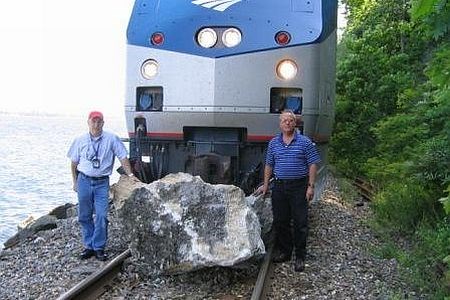David Wood didn’t choose a career in assessing rock fall hazards, it’s a specialty he sort of tumbled into.
As an engineering geologist with 30-years experience in rock mechanics, his consulting work can be a 24/7 job.
Clients like the Ontario Ministry of Transportation (MTO) and Canadian Pacific Railway (CP) have him on speed-dial.
When a boulder dropped in front of an Amtrak passenger train in upstate New York on a Friday afternoon, he interrupted his cottage-time on Lake Panache, near Sudbury, and was driving to the scene that night.
As the only independent rock engineer in Northern Ontario, and "arguably the only one in Ontario," juggling multiple projects on spur-of-the-moment notice is something the Sudbury-based consultant is accustomed to.
When he came to Canada to work for Golder Associates in the mid-1970s, rock engineering was such a specialized field, he created a new immigration category for himself to gain entry.
Raised in Farnborough, England, his interest in geology began by studying the English countryside and wondering, “what is it that makes scenery, scenery?”
He earned an undergrad degree in physical geology - studying hard rock geology and applied geophysics - at Exeter University and later went back to obtain his masters engineering degree in rock mechanics at the University of London.
At Golder, he worked his way from a junior engineer to an associate position, working in Argentina before getting the consulting bug in the early 1990s.
His expertise in shotcrete (sprayed concrete used for support in underground mining) led him to Sudbury and he has since made connections with Inco and Falconbridge.
Sensing he had a niche service offering, Wood established his home-based consulting business – David F. Wood Consulting – in 1996 with his partner and wife, Diane, who manages the books.
A good chunk of his work involves analyzing and evaluating rock masses for hazards and stability issues, along with ground support design, and collecting geological and geotechnical field data for reporting on a wide range of civil engineering and mining projects.
About 90 per cent of his business revolves around appraising fall hazards and conducting blast reviews for the MTO, CP and the Niagara Rock Tunnel where he is the engineer of record.
The latter is a billion-dollar Ontario Power Generation tunnel boring project designed to divert water from Niagara Falls to the Adam Beck power plant.
His spacious home office, replete with hammock, contains thick folders of the multitude of projects he’s simultaneously working on. "I often do work on the side as I’m doing a major job."
There are not too many highway or railway rock cuts in the North that Wood doesn’t have intimate knowledge of. And with a multitude of government money earmarked for highway upgrades, there’s no shortage of work.
Wood unrolls a map of northeastern Ontario of every major highway and secondary road that he has inspected or is in the process of doing so.
"I find it unbelievable that clients are willing to pay me to drive around this gorgeous province looking at rocks."
To be able to walk in the historic footsteps of the railway engineers who blasted their way through Canadian Shield granite using black powder is "absolutely amazing."
Nowhere is that more evident than the Mink Tunnel on the north shore of Lake Superior where the tracks hug a sliver of shoreline wedged against hundred-foot high bluffs.
"If a rock fall were to occur there’s only one place for anything to go."
Making assessments on how rock will weather and erode over time, or behave during a controlled blast, is not something that can be easily predicted or taught in a classroom using the latest modelling software.
But it’s essential information for clients boring a hydroelectric tunnel, carving out a four-lane highway or figuring out how to anchor a suspended walkway for a waterfront project.
Each client’s methodology is different, but field work basically involves inspecting a rock mass with measurements and photos, plotting it on a map, and making a report recommendation of a required action ranging from ‘urgent’ to ‘no action required.’
The recommendation could shut down a major rail line or involve draping a wire mesh over a highway to contain falling rock. He often reviews blasting plans for major highway projects to ensure there is an appropriate rock cut set-back.
Understanding geology is an important part of any engineering project where there is rock involved in a foundation, said Wood.
But unlike most analytical engineering disciplines, understanding the values of rock mechanics is mostly emperical.
Apart from soils, a traditionally-taught engineer can’t chip away at a rock cut with a hammer and assess the strength value of a rock face.
"That’s why it’s so difficult for many people in my field to become professional engineers because we don’t think in straight lines and right angles," said Wood.
"You’re making sense of an observation and making interpretations based on a sound background."
In Northern Ontario construction projects, he often finds his expertise is brought in relatively late in the design or early in the building process.
Civil engineers and architects often design a project without a true understanding of rocky site conditions and the impact it plays in anchoring a building.
It goes back to the education of engineers where Wood feels young people are graduating with an "incomplete tool kit" in geology.
Wood would like to see schools like Laurentian University dedicate more course time to fix these deficiencies.
"The skill set I have is based on experience, more than education."
Wood said he would love to teach or be able to mentor a junior partner. But he adds it’s difficult to find the time to run his micro-firm with his limited resources.
"I would love to be involved in that but I’m not and that’s a source of frustration, because I really love what I do immensely."
www.dfwood.com




